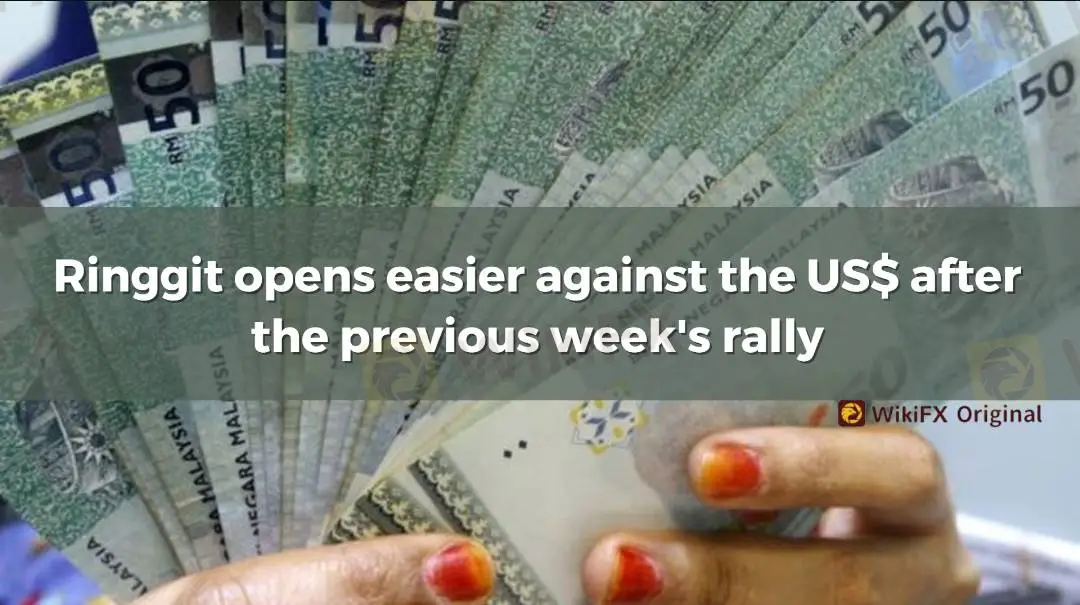简体中文
繁體中文
English
Pусский
日本語
ภาษาไทย
Tiếng Việt
Bahasa Indonesia
Español
हिन्दी
Filippiiniläinen
Français
Deutsch
Português
Türkçe
한국어
العربية
Ringgit opens easier against US$ after previous week's rally
Abstract:According to an analyst, the Malaysian ringgit started the day with a slight depreciation against the US dollar in response to indications of deflation in the US markets.

During the morning session, the Malaysian ringgit was observed trading at 4.5355/5415 against the US dollar, slightly higher compared to the previous closing rate of 4.5255/5280 on Friday. Stephen Innes, the managing director at SPI Asset Management, expressed a cautious view on the ringgit's recent improvement, considering the negative outlook in
China and the anticipated rate cuts that may weaken the Chinese yuan. He suggested that the ringgit might experience a minor retreat or consolidate its gains from last week. In an interview with Bernama, Innes shared his insights on the potential trajectory of the currency.
Stephen Innes emphasized the significance of China's second-quarter GDP and Industrial Production data, which will dictate the direction of the ringgit today. He explained that positive data from China would strengthen the Chinese yuan and subsequently have a positive impact on the ringgit.
On the other hand, Dr. Mohd Afzanizam Abdul Rashid, the Chief Economist and Head of Social Finance at Bank Muamalat Malaysia Bhd, suggested that the ringgit could stabilize at its current level as market participants anticipate the upcoming Federal Open Market Committee (FOMC) meeting in the United States.
These two perspectives highlight the factors influencing the ringgit's movement, with attention on China's economic data and the forthcoming FOMC meeting.
In addition, Stephen Innes expressed concerns about the sustainability of China's economic recovery, which he believes will prompt the People's Bank of China to maintain an accommodative monetary policy stance.
He further stated, “Taking all factors into consideration, I anticipate the MYR/USD exchange rate to hover around the range of RM4.52-RM4.53 today.”
Meanwhile, the ringgit faced depreciation against a basket of major currencies.
Against the euro, the ringgit weakened to 5.0902/0969 from the previous close of 5.0799/0827 on Friday. It also declined against the British pound, slipping to 5.9370/9448 from 5.9338/9371 previously. Furthermore, it slid versus the Japanese yen to 3.2747/2795 from 3.2659/2679 last week.
In addition, the ringgit faced depreciation against other ASEAN currencies. It dipped against the Thai baht, trading at 13.0857/1091 compared to the previous close of 13.0689/0814. It also declined against the Singapore dollar, sliding to 3.4321/4369 from 3.4263/4287. Moreover, it eased against the Indonesian rupiah, weakening to 303.1/303.7 from 302.5/302.8 last week. Lastly, it weakened against the Philippines' peso, trading at 8.33/8.35 from 8.31/8.33 previously.

Disclaimer:
The views in this article only represent the author's personal views, and do not constitute investment advice on this platform. This platform does not guarantee the accuracy, completeness and timeliness of the information in the article, and will not be liable for any loss caused by the use of or reliance on the information in the article.
Read more

Avoid Losing Money: 6 Red Flags That Make LQH Markets Risky Choice
The only true way to protect your hard-earned money in the forex market is by staying informed and alert. With the growing number of fraudulent brokers, this dynamic and tempting market has become increasingly risky. Awareness is your best defense. This article serves as another important scam alert, to help you stay safe and avoid losing your money.

Most Volatile Currency Pairs You Should Know Before Trading
Do you think that trading in the most volatile currency pairs is a loss-making proposition? Maybe you are missing out on the profit waiting for you! Yes, you still need to be tactical and strategic when opening and closing positions. However, the increased possibility of dramatic price movements in currency pairs opens up avenues for higher profits while also exposing you to market risks. In this article, we will discuss the most volatile forex pairs worldwide. Read on!

Is Learning Forex Trading Online a Good Idea? Pros and Cons Explained
Forex trading is becoming more popular around the world. To help with this, many brokers are offering forex education courses. Some are free, and some are paid. Some brokers even have special academies to teach trading. This trend is growing fast, but the big question is: Is learning forex online really helpful? And what are the risks that you may not know about? I

FNmarkets: Is It a Scam? 5 Warnings You Shouldn’t Ignore
"FN Markets is a scam broker." You might come across this statement on many websites, but in this article, we’ll highlight the key red flags that show why this broker is considered a scam.
WikiFX Broker
Latest News
XS.com Broker Partnership Expands Liquidity with Centroid Integration
EC Markets: A Closer Look at Its Licenses
Housewife Scammed of RM68,242 in Online Investment Scam
ASIC Regulated Forex Brokers: Why Licensing Still Matters in 2025
From Charts to Profits: Unleashing the Power of Forex Trading Tools
FCA Publishes New Warning List! Check It Now to Stay Safe
Forex Hedging Strategies - Calming You Amid Market Chaos
LSEG Announces £1 Billion Share Buyback Program
Ultima Markets enters the UK and gains the FCA license
SEC Lawsuit Targets Real Estate Fraud Scheme by Joseph Nantomah
Currency Calculator


